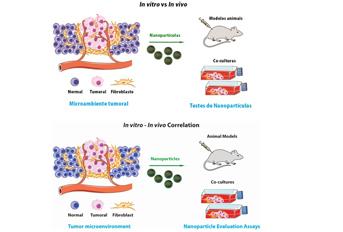Associação Portuguesa de Investigação em Cancro
Co-cultures models of cancer cells for testing new therapeutic nanosystems
Co-cultures models of cancer cells for testing new therapeutic nanosystems

Nowadays, nanotechnology has been considered as a potential tool for the development of new drug delivery systems, such as nanoparticles. Although, before these approaches can be considered as anti-tumoral treatments, they need to be thoroughly tested under high controlled conditions that reproduce the tumors microenvironment. In vivo, tumors are complex tissues comprised by cancer cells enclosed in a stroma, essentially formed by fibroblasts. These stromal cells play an essential role in the regulation of cancer cells behaviour, having the capacity to upgrade cancer cells drug resistance. Thus, like co-cultures models with cancer cells and fibroblasts have been widely used for nanoparticles development. In the present study we used different ratios of breast cancer cells to fibroblasts, in order to better mimic in vitro the breast tumor microenvironment heterogeneity. The confocal microscopy and flow cytometry results demonstrate that different concentrations of fibroblasts in co-culture could influence the cellular uptake of the polymeric nanoparticles studied.
Authors and affiliations:
Elisabete C. Costa, Vítor M. Gaspar, João G. Marques, Paula Coutinho, Ilídio J. Correia
CICS-UBI - Centro de Investigação em Ciências da Saúde, Universidade da Beira Interior, 6200-506, Covilhã, Portugal
Paula Coutinho: UDI-IPG - Unidade de Investigação para o Desenvolvimento do Interior , Instituto Politécnico da Guarda, Portugal
Abstract:
Co-culture models are currently bridging the gap between classical cultures and in vivo animal models. Exploring this novel approach unlocks the possibility to mimic the tumor microenvironment in vitro, through the establishment of cancer-stroma synergistic interactions. Notably, these organotypic models offer a perfect platform for the development and pre-clinical evaluation of candidate nanocarriers loaded with anti-tumoral drugs in a high throughput screening mode, with lower costs and absence of ethical issues. However, this evaluation was until now limited to co-culture systems established with precise cell ratios, not addressing the natural cell heterogeneity commonly found in different tumors. Therefore, herein the multifunctional nanocarriers efficiency was characterized in various fibroblast-MCF-7 co-culture systems containing different cell ratios, in order to unravel key design parameters that influence nanocarrier performance and the therapeutic outcome. The successful establishment of the co-culture models was confirmed by the tissue-like distribution of the different cells in culture. Nanoparticles incubation in the various co-culture systems reveals that these nanocarriers possess targeting specificity for cancer cells, indicating their suitability for being used in this illness therapy. Additionally, by using different co-culture ratios, different nanoparticle uptake profiles were obtained. These findings are of crucial importance for the future design and optimization of new drug delivery systems, since their real targeting capacity must be addressed in heterogeneous cell populations, such as those found in tumors.
Journal:
PLoS ONE
Link:
http://www.plosone.org/article/info%3Adoi%2F10.1371%2Fjournal.pone.0070072
DOI:




